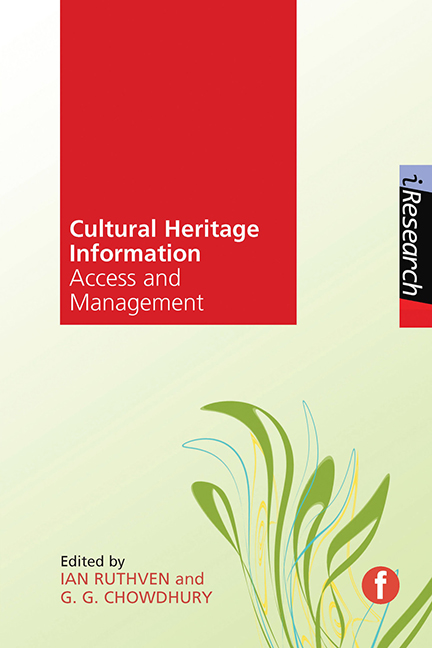Book contents
- Frontmatter
- Contents
- List of figures and tables
- Contributors
- Preface
- 1 Managing digital cultural heritage information
- 2 Digital humanities and digital cultural heritage (alt-history and future directions)
- 3 Management of cultural heritage information: policies and practices
- 4 Cultural heritage information: artefacts and digitization technologies
- 5 Metadata in cultural contexts – from manga to digital archives in a linked open data environment
- 6 Managing cultural heritage: information systems architecture
- 7 Cultural heritage information: users and usability
- 8 A framework for classifying and comparing interactions in culturalheritage information systems
- 9 Semantic access and exploration in cultural heritage digital libraries
- 10 Supporting exploration and use of digital cultural heritage materials: the PATHS perspective
- 11 Cultural heritage information services: sustainability issues
- Index
3 - Management of cultural heritage information: policies and practices
Published online by Cambridge University Press: 10 September 2022
- Frontmatter
- Contents
- List of figures and tables
- Contributors
- Preface
- 1 Managing digital cultural heritage information
- 2 Digital humanities and digital cultural heritage (alt-history and future directions)
- 3 Management of cultural heritage information: policies and practices
- 4 Cultural heritage information: artefacts and digitization technologies
- 5 Metadata in cultural contexts – from manga to digital archives in a linked open data environment
- 6 Managing cultural heritage: information systems architecture
- 7 Cultural heritage information: users and usability
- 8 A framework for classifying and comparing interactions in culturalheritage information systems
- 9 Semantic access and exploration in cultural heritage digital libraries
- 10 Supporting exploration and use of digital cultural heritage materials: the PATHS perspective
- 11 Cultural heritage information services: sustainability issues
- Index
Summary
Introduction
As discussed in Chapter 1, managing digital cultural heritage information involves a number of challenges ranging from digitization of objects and artefacts to various knowledge organization and access issues that include metadata, indexing and retrieval; various user and social challenges such as information seeking and retrieval in the context of various community, culture, language, etc.; accessibility to ICT and internet, including digital divide and social exclusion; intellectual property and digital rights management issues; and so on.
Digitization – the process of converting analogue cultural heritage content into its digital form – is a resource-intensive activity and a successful digitization programme should be governed by a number of policy decisions. Since cultural heritage may include a wide variety of two- and three-dimensional objects in different forms, shapes and sizes with different specific characteristics and attributes, digitizing them in the most appropriate form poses a number of challenges. Terras (2012) argues that although mass digitization of cultural heritage objects began only a decade ago, small-scale initiatives in creating digital images of information objects in library and information institutions can be traced back to the early 1980s. However, she notes that massive digitization programmes began within the last decade with the introduction of major externally funded initiatives, such as the European eContentplus programme (European Commission, 2014) and the Jisc Content Digitization programme (Jisc, 2013). In order to support digitization activities a variety of best-practice guidelines have been produced over the past decade by experts (see, for example, Hughes, 2004; Anderson and Maxwell, 2004; Puglia and Rhodes, 2007) as well as institutions (see, for example, various guidelines that appeared under The Federal Agencies Digitization Guidelines Initiative (FADGI, 2014), the British Library Digitisation Strategy (British Library, 2014) and the Jisc Digitization Workflow Guidelines (Abu-Zayed, 2009). This chapter discusses some of these policies and guidelines for digitization that form the foundation of digital libraries of cultural heritage information.
Managing digital cultural heritage information also involves a number of social, legal and policy issues. There is a general consensus that cultural heritage information should be made available to everyone for social good. However, there are a number of intellectual property and digital rights management issues. Tsolis et al. (2011) discuss the complex copyright and digital rights management issues and challenges associated with digital cultural heritage information.
- Type
- Chapter
- Information
- Cultural Heritage InformationAccess and Management, pp. 37 - 62Publisher: FacetPrint publication year: 2015
- 2
- Cited by



